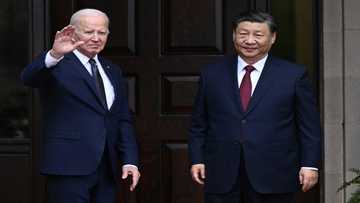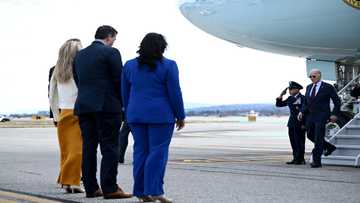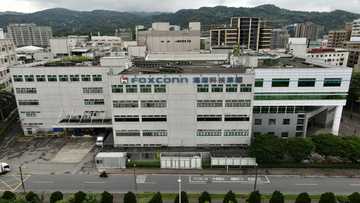China ready to be 'partner and friend' of US: Xi

Source: AFP
China is "ready to be a partner and friend of the United States," President Xi Jinping told US business leaders on Wednesday, as concerns mount over the country's slowing economy.
If one country sees the other as a main competitor and most consequential geopolitical challenge, "this will only lead to wrong policymaking, misguided actions and unwanted results," he told a dinner on the sidelines of the Asia-Pacific Economic Cooperation (APEC) summit.
Xi's remarks in San Francisco came hours after his highly anticipated talks with US President Joe Biden, where both men pledged to reduce tensions as they met for the first time in a year.
The two sides announced a host of agreements after talks at the luxury Filoli Estate, starting with the reactivation of a high-level military hotline.
"We should build more bridges and pave more roads for people-to-people interactions," Xi told an audience of around 400 business leaders, government officials and academics.
"We must not create various obstacles or create a chilling effect," he added.
PAY ATTENTION: Click “See First” under the “Following” tab to see YEN.com.gh News on your News Feed!
Among those on a guest list seen by AFP were Apple CEO Tim Cook, Laurence Fink of BlackRock and Pfizer CEO Albert Bourla.
Xi's comments at the event organized by the US-China Business Council and National Committee on US-China Relations were being closely watched, given worries about China's tighter business oversight and bilateral tensions.
Foreign business confidence in China hit its lowest point in years according to US and European enterprise lobbies in September, with US firms increasingly looking to shift investment away.
'Open for business'
"Xi is interested in signaling that despite geopolitical tensions -- especially around the high tech industries -- China remains open for business," said Lindsay Gorman, senior fellow at the German Marshall Fund of the United States.
But, she told AFP, "there is a lot more skepticism" from US firms than 10 years ago, even if some may be eager to overcome tensions.
Thibault Denamiel, associate fellow at the Center for Strategic and International Studies (CSIS), noted that Chinese tech giant Huawei unexpectedly unveiled a new smartphone -- involving advanced 7 nanometer technology -- during US Commerce Secretary Gina Raimondo's visit to China this year.
It appears that Chinese authorities are sending a dual message, that they can weather geopolitical headwinds such as US chip controls, while encouraging foreign businesses to keep coming, he added.
Xi said on Wednesday that China wants to invite 50,000 young Americans to the country on exchange and study programs over the next five years, and that Beijing was ready to further cooperation on panda conservation, though no new animal loans were promised.
The Chinese leader, who recently met California Governor Gavin Newsom, said he would welcome visits from regional politicians and members of Congress.
But in a reminder of the still-sticky state of China-US ties, Mike Gallagher, a Wisconsin Republican who chairs the bipartisan House Select Committee on the Chinese Communist Party, lashed out at the attendance at the meeting by senior US business leaders.
It is "unconscionable" for US companies to pay thousands for a welcome dinner hosted by the Communist Party, he wrote in a letter this week, given allegations that they have overseen a "genocide" against people in China's northwestern Xinjiang region.
Gallagher added that executives "must recognize that the reality of doing business in China today includes the increased risk of arbitrary detentions, exit bans, and raids by the Chinese intelligence services," urging firms to reduce the risks they face.
New feature: Сheck out news that is picked for YOU ➡️ click on “Recommended for you” and enjoy!
Source: AFP




